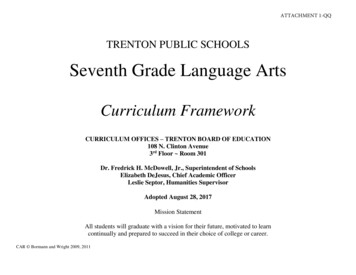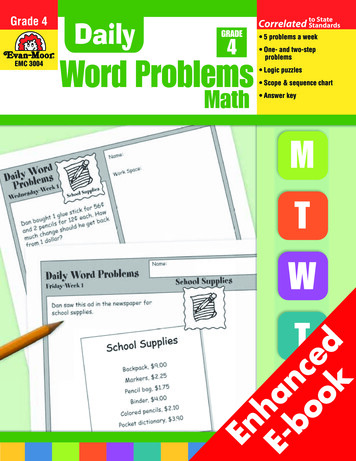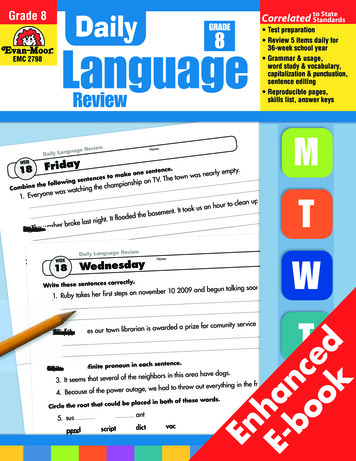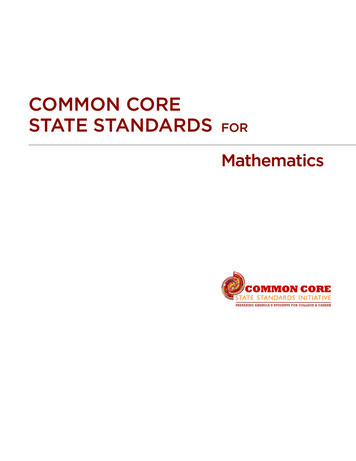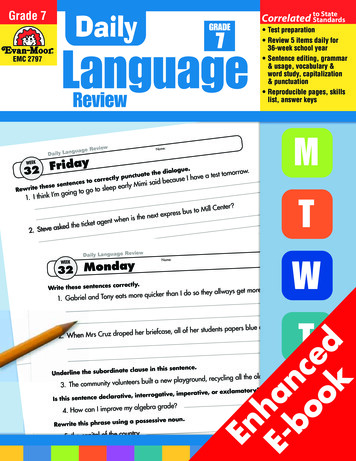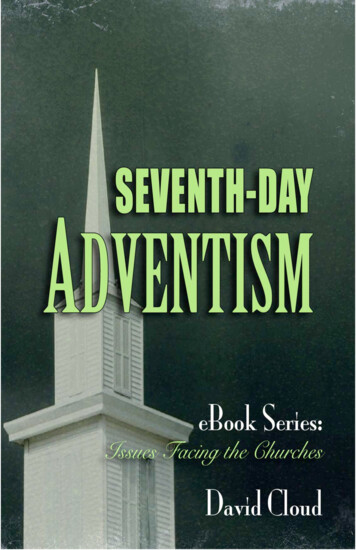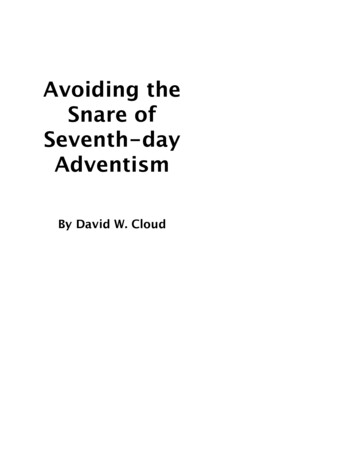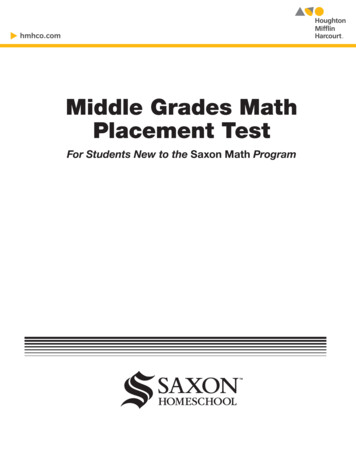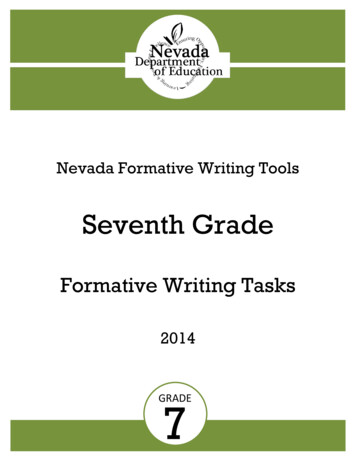
Transcription
Nevada Formative Writing ToolsSeventh GradeFormative Writing Tasks2014GRADE7
Nevada Department of EducationDale A. R. ErquiagaSuperintendent of Public InstructionDr. Steve CanaveroDeputy Superintendent for Student AchievementCynthia SharpDirector of Assessment, Program Accountability, and CurriculumFor additional information, please contact:Darrin Hardman,Education Programs Professionaldhardman@doe.nv.gov702.486.6602Lisa FordEducation Programs Professionallford@doe.nv.gov702.486.6561Carson City (Main)700 E. Fifth StreetCarson City, NV 89701Las Vegas (Southern Office)9890 South Maryland Parkway, Suite 221Las Vegas, Nevada 89183
ContentsIntroduction to the Writing Tasks . . . 1Guidelines for Administering the Writing Tasks . 3Teacher Checklist for Administering the Writing Tasks . . 5Teacher Checklist for Evaluating the Writing Tasks . . 6Student Directions Grade 7 Argumentative Writing Task A . . . 7(Use the standards for good criticism in the first passage to evaluate the literary quality of short story.)Directions for Administering the Grade 7 Argumentative Writing Task A . 13Student Directions Grade 7 Argumentative Writing Task B . . . . 17(Explain whether or not a character overcomes his fear over the course of the play.)Directions for Administering the Grade 7 Argumentative Writing Task B . . 21Student Directions Grade 7 Informative/Explanatory Writing Task A . . 25(Write a newspaper article about what happened during the Grenheim Heist.)Directions for Administering the Grade 7 Informative/Explanatory Writing Task A . 28Student Directions Grade 7 Informative/Explanatory Writing Task B . . . 32(Explain why “Capricious” and “Prudence” are appropriate names for the main characters in the story.)Directions for Administering the Grade 7 Informative/Explanatory Writing Task B . . 35Student Directions Grade 7 Informative/Explanatory Writing Task C 39(Identify the barriers that Marian Anderson overcame to become one of the most celebrated singers.)Directions for Administering the Grade 7 Informative/Explanatory Writing Task C . . 42(Continued on next page)
Student Directions Grade 7 Narrative Writing Task A . . 46(Write an imagined testimony about a robbery at a museum.)Directions for Administering the Grade 7 Narrative Writing Task A . . 49Student Directions Grade 7 Narrative Writing Task B . . . . 53(Write a narrative from a genie’s point of view about an encounter with four friends.)Directions for Administering the Grade 7 Narrative Writing Task B . . . 56Student Directions Grade 7 Narrative Writing Task C 60(Write a modern-day folk tale with the same narrative techniques as two folk tales from different cultures.)Directions for Administering the Grade 7 Narrative Writing Task C . . . . 63Teaching Tips . 67
Introduction to the Writing TasksThe Nevada Formative Writing Tasks (Formative Tasks)were developed to help students, teachers, andadministrators implement the Nevada Academic ContentStandards for English Language Arts (NACS for ELA) andprepare for the administration of the spring 2015 SmarterBalanced assessments. The tasks are intended to: The Nevada FormativeWriting Tasks illustratethe depth ofunderstanding of theNevada AcademicContent Standards forEnglish Language Artsthat will be measured onthe Smarter Balancedassessments. Encourage students to read closely and analyzeinformation;Enable students to produce effective and wellgrounded writing for a range of purposes andaudiences;Empower teachers to shift and improve instruction tomeet the demands of the NACS;Inform teachers and students when timelyadjustments can be made; andProvide an early look into the types of writingperformance tasks expected on the SmarterBalanced assessments.The Formative Tasks are timed, on-demand, classroomwriting assignments. They include uniform student directionsfor writing responses and uniform teacher directions foradministering the tasks. Each task was carefully created forconsistency of format, content, and administrationprocedures, allowing teachers to monitor student progressover time. This consistency also makes it possible forteachers to participate in collaborative groups to discussstudent progress and refine delivery of writing instruction.“[Students] need to be able to use technology strategically when creating,refining, and collaborating on writing. They have to become adept atgathering information, evaluating sources, and citing material accurately,reporting findings from their research and analysis of sources in a clear andcogent manner. They must have the flexibility, concentration, and fluency toproduce high-quality first-draft text under a tight deadline as well as thecapacity to revisit and make improvements to a piece of writing overmultiple drafts when circumstances encourage or require it.”Nevada Academic Content Standards for English Language Arts &Literacy in History, Social Studies, Science, & Technical Subjects (p. 41)Working Copy March 14, 20131
All fifth and eighth grade students are required by NRS389.550 to participate in at least one Nevada FormativeWriting Task during the 2013-14 school year. However, theNDE has provided multiple tasks for use in third througheighth grades, allowing teachers to monitor students atmultiple points during the school year and adjust theirinstruction to match the needs of students.To improve the consistency of evaluating the tasks and otherclassroom writing assignments, the NDE released TheNevada Formative Writing Tools: Grade 7 Evaluation Guides(Evaluation Guides) that include: Analytic writing rubrics developed by the SmarterBalanced Assessment Consortium;Checklists to support teachers when learning therubrics and documenting student progress;Student writing guides to support students in allphases of the writing process (before, during, andafter); andA glossary of terms used in the Evaluation Guides toestablish a common vocabulary for writing.The Evaluation Guides identify a student’s level of commandfor each of the five characteristics of writing and can bedownloaded athttp://www.doe.nv.gov/Nevada State Writing Assessment/.Knowing these levels will help teachers and students identifystudent strengths and areas to improve. The NDEencourages districts and schools to establish policies forhow and when to use the rubrics and checklists for gradingother classroom assignments.However, the NDE strongly discourages teachers andschools from using the results of the Formative Tasks aspart of their grading, since they were not designed assummative or interim assessments. Instead, teachers andschools should use the formative tasks to gather informationneeded to inform and enhance both teaching and learning.Working Copy March 14, 20132Results from the NevadaFormative Writing Taskswill not be used tocalculate a school’s ratingon the Nevada SchoolPerformance Framework.However, the NDE willcollect and reportparticipation rates on eachschool’s report card (asrequired by NRS 389.550 ).Since the results of thetasks are relatively lowstakes for schools andteachers, keep them lowstakes for students by notassigning grades to them.
Guidelines for Administering the TasksWHO:All fifth and eighth grade students who are enrolled in public schools, including charter schools,are required to take at least one Formative Task during the 2013-14 school year. It is stronglyrecommended for students in third, fourth, sixth, and seventh grades. Students with disabilitiesand students classified as having limited English proficiency (LEP) must also participate.Accommodations are made for IEP, LEP, and/or 504 students who have testingaccommodation plans. The classroom teacher must make certain that all students with specialneeds receive permissible appropriate accommodations, as indicated in IEPs, LEPs, 504 plans,and Testing Accommodation Plans.WHAT:The Formative Tasks have students read closely and analyze information to produce effectiveand well-grounded writing for a range of purposes and audiences. For the 2013-14 schoolyear, the NDE provides tasks for the three text types in the NACS (opinion/argumentative,informative/explanatory, and narrative).Since the tasks are formative, classroom teachers will evaluate their own students’ responsesusing the Evaluation Guides provided by the NDE(http://www.doe.nv.gov/Nevada State Writing Assessment/). It is strongly recommended thateach task be evaluated twice: by the student’s classroom teacher and by another teacher. Thiswill facilitate collaborative teams that build a vision of good writing and can focus on using theresults of the Formative Tasks to improve teaching and student learning.The NDE will neither score student responses nor collect student results. However, theNDE will collect participation data in May from each school and each classroom inaccordance with NRS 389.550. Participation rates will be published on every school’sNevada Accountability Report.WHERE:It is strongly recommended that the Formative Tasks be administered by the student’sclassroom teacher in the regular classroom or computer lab.WHEN:March 3, 2014, through May 9, 2014, is the timeframe for administering the Formative Tasks.Each district and school may determine exact testing days and times within this testing window.Please check with your district’s test director for specific days and times within the mandatedtimeframe.WHY:Descriptive feedback is widely considered an important element of improved writingperformance. When students understand their strengths and weaknesses and are taughthow to improve their writing, they learn faster and retain what they have learned longer.The Formative Tasks and Evaluation Guides can help teachers provide constructive feedbackand help students become self-regulated learners. Since the tasks and Evaluation Guides arebased on the NACS and performance task specifications for the Smarter Balancedassessment, they also play an essential role in aligning teaching, learning, and assessmentwhile allowing districts, schools, and teachers to use them to begin planning the shifts ininstruction that will be required to help students meet the demands of the standards andprepare for the Smarter Balanced assessment in 2015.Working Copy March 14, 20133
HOW:The Formative Tasks are timed, on-demand classroom writing assignments. The tasks includeuniform student directions for writing responses and uniform teacher directions for administeringthe tasks. The tasks have been carefully designed for consistency of format, content, andadministration procedures, allowing teachers to monitor progress over time.Each task is administered in two timed sessions that should not exceed 45 minutes each.Teachers may administer the sessions over two consecutive days or on the same day with a 15minute break between sessions. The first 45 minute session involves introducing students tothe writing task, helping students understand how the tasks will be evaluated, having studentsindependently read information, and beginning to draft a well-grounded response. The second45 minute session involves writing, revising, and editing their final draft.Teachers should provide each student with a paper copy of the student directions for theselected task. Please check with your district to determine if the district has selected a task forthe entire district to use. The NDE will not provide printed copies for schools.Teachers may also provide each student with a copy of the Student Writing Guide that matchesthe writing mode of the task (i.e., the Grade7 Student Writing Guide for Argumentative Writingfor seventh grade students responding to the seventh grade argumentative tasks). Theseguides can be found in the Evaluation Guides athttp://www.doe.nv.gov/Nevada State Writing Assessment/.Since the 2015 administration of the Smarter Balanced assessment is computer based,students should use a word processor (i.e., Microsoft Word) to write their responses. Usingtechnology to produce and publish writing is part of the NACS and keyboarding skills areintroduced in second grade in the Nevada Computer and Technology Standards (2010).Students may use spell check and grammar check. They should not use any other electronicresources, including the Internet, during the task. All students are expected to word processtheir responses to the Formative Tasks. Students with IEPs may use pre-approved electronicdevices as designated in their IEPs and are consistent with their testing accommodations.In addition, each student should have at least one blank sheet of paper (lined or unlined) and apencil. Students can use these tools to plan their writing (i.e., individually brainstorm, creategraphic organizers) and create their first drafts. However, students may also word process theirfirst drafts on computers, if they prefer.Students may also use highlighters and colored pencils for planning, revising, and editing.Regular paper Standard English dictionaries are also allowed for all students. In addition,paper bilingual dictionaries with word-to-word translations are approved for LEP studentsidentified to receive this accommodation and used previously as part of regular instruction.Teachers do not need to cover bulletin boards, posters, or other materials used as part of dailyinstruction.Teachers will NOT translate any part of the directions.Teachers will NOT read any part of the student directions that call for the student toread, unless such accommodations are specified in a student’s accommodation plan.Working Copy March 14, 20134
Teacher Checklist for Administering the Writing TasksCompleting the following steps will help ensure successful administration of the Formative Tasks. Carefully read all of the contents of this manual. Check your district testing schedule for any specific test dates for your district. Check with your district to determine if they have selected a task for the entire district to administer. Check with the special education facilitators, LEP testing coordinators, and 504 building officers for anystudents who need to receive special accommodations. Ensure that procedures and materials for testing special student populations follow those specified bythe Nevada Department of Education and that students with special needs receive the appropriateaccommodations. Ensure that you have all of the materials for administering the formative task:Print copies of the student directionsOptional: Print copies of the student guide that matches the task (i.e., opinion guide for opiniontask) (see page 13-15 in The Nevada Formative Writing Tools: Grade 7 Evaluation Guides athttp://www.doe.nv.gov/Nevada State Writing Assessment/)PencilsBlank scratch paper (lined or unlined)Standard English dictionaries (optional)Bilingual dictionaries with word-for-word translations (only for LEP students approved toreceive this accommodation and who use them as part of their classroom instruction)Highlighters and colored pencils or pens during testing sessions (if students have been usingthese during regular classroom instruction)Printer paper (optional for printing hard copies of student essays)Books for students to read if they finish early (paper only) Check computers to make sure they are ready. Check with your school/district for special procedures on how to save essays on the school/districtnetwork. Review computer procedures with your students:Open a new blank documentMaintain default font size and color (i.e., 12 point and black)Save documentsPrint files Make arrangements with another teacher to exchange and evaluate tasks. Make plans for how you will provide feedback to students for improving their writing (i.e., conferences).Working Copy March 14, 20135
Teacher Checklist for Evaluating the Writing TasksCompleting the following steps will help ensure consistent evaluation of the Formative Tasks. Work with another teacher so that each student’s essay is evaluated twice. Reread the Evaluation Guides (rubric or checklist) for the type of writing that matches the task(opinion/argumentative, informative/explanatory, or narrative) and highlight or underline key information.(Evaluation Guides can be downloaded at http://www.doe.nv.gov/Nevada State Writing Assessment/) Reread the exemplar papers for the type of writing that matches the task and review how thecharacteristics of the paper relate to the level of each trait. (Argumentative Exemplars can bedownloaded at http://www.doe.nv.gov/Nevada State Writing Assessment/) Read entirely each essay before assigning a level for each of the five traits. Refer to the language in the rubric and the exemplar papers when assigning levels. Cover the first evaluator’s levels before the essay is evaluated the second time (this is optional butmany teachers find it helpful if they don’t know how the first teacher evaluated the papers). Discuss the levels, understanding that it is normal for some traits to have some split levels (1-2 or 3-4). Discuss any discrepant levels. Levels are discrepant when one teacher evaluates a trait as proficient (4or 3) and another teacher evaluates that same trait as not proficient (2 or 1).When a trait is rated 1-3, 1-4, 2-3, or 2-4, both teachers should review the rubric, checklist, andexemplar papers to determine if the paper is proficient or not (for feedback purposes).Proficient(Meets or Exceeds Standard)4ThoroughUnderstandingNot Proficient(Below Standard or Understanding1MinimalUnderstanding Identify trends (i.e., overall, what traits were strong or weak) and how that will impact instruction. Prioritize the weakest trends and plan instruction to remediate weaknesses.Working Copy March 14, 20136
Student Page 1Student DirectionsGrade 7 Argumentative Writing Task AYOURYou will read two passages. One discusses how to be a good critic; the other isASSIGNMENT: a short story. Take notes on these two passages. You will then plan and write anargumentative essay about the short story, using the information you learned inthe first passage.STEP 1Read the passages and take notes on these sources.Read the following passages. Take notes to use while writing your essay. Youcan look back at the passages and your notes as often as you like. “Is Criticism a Four-Letter Word?”“Lab Partners”As you read, collect information from “Is Criticism a Four-Letter Word” to helpyou evaluate the quality of “Lab Partners.”STEP 2Plan and write your essay.Review your notes and sources, then plan and draft your essay on the followingtopic:Use the standards for good literature that are described in “Is Criticism aFour-Letter Word?” to evaluate the literary quality of “Lab Partners.”STEP 3Revise and edit your essay.The teachers evaluating your essay will be assigning levels for: Statement of Purpose/Focus—how well you clearly state your claim onthe topic, maintain your focus, and address the alternate or opposingclaims Organization—how well your ideas logically flow from the introduction toconclusion using effective transitions, and how well you stay on topicthroughout the essay Elaboration of Evidence—how well you provide evidence from sourcesabout your claim and elaborate with specific information Language and Vocabulary—how well you effectively express ideas usingprecise language that is appropriate for your audience and purpose Conventions—how well you follow the rules of usage, punctuation,capitalization, and spellingTeachers reading your essay will evaluate only your final draft.Working Copy March 14, 20137GO ON
Student Page 2Is Criticism a Four-Letter Word?by Steven Frank1The movie was E. T. The moment we stepped out of the theater, my older brother asked thedreaded question: "What did you think of the film?"Whatever opinion I held of the "film" was about to be shredded."I'll tell you as soon as I go to the bathroom."He followed me in.5Turning away for maximum privacy, I confessed that I had liked the movie. It had moved me."Well," my brother said, "I found it maudlin and manipulative. 'E.T.phone home.’ Honestly, Steve."I spent the rest of my childhood keeping my opinions of books andmovies to myself.maudlin: tryingtoo hard to makepeople feelemotionsSince then, I've spent a lot of time wondering whether criticism is a four-letter word. Ofcourse, I can count nine letters there, but is the spirit of the word offensive? I decided to ask mystudents what they thought, so I wrote criticism on the board, and we played the first-word-thatcomes-to mind game.Judgmental, mean, nasty, and hurtful were the top four responses.10"Is all criticism negative?" I asked.The consensus was yes.I tried a different word: review.Opinion, evaluation, advice, and guide, they responded.semantics: relating tothe meaning of wordsIt may be a question of semantics.15People don't like the word criticize because it's what they think their parents always do: Yourroom could double for the city dump.Is it any wonder that parents often hear their anguished teens shouting, "Why do you alwayscriticize me?"Suppose we swapped words — and attitudes. "Mom, I'd like you to review my room, please."Working Copy March 14, 20138GO ON
Student Page 3"Review it?""Yes. Evaluate it. Constructively. Sensibly."20Then a conversation might take place. "Well, honey, I've noticed some specific hazards there.The DVDs on the floor, for instance, are slippery, and if you step on one in the middle of the night,you might fall. Further, that turkey sandwich you forgot to throw away is starting to grow mold. Andif you wanted to invite a friend over, it might help if you cleared a space on your chair for him to sitdown."Notice that in this scenario, the parent is supporting her opinion with concrete evidence. Thecriticism feels less, well, critical, because it makes sense. And that's what a good piece of criticismought to do.Suppose you're asked to write a critical evaluation of a book. Don't just trash it. You shouldtake an honest look at what works about it and what doesn't. Start with an opinion, but be sure toback up that opinion by answering a few key questions: Are the characters credible? Do they think,feel, and act like human beings (even if they're aliens)? The poet Marianne Moore once describedwhat readers want in literature as "imaginary gardens with real toads." The setting of a book can beas outrageous as a strange world down a rabbit hole, but the characters that live there must seembelievable.They should also be well rounded. Look for characters that seem real, not stereotypical. Goodheroes have flaws; good villains have fans. Take Satan, for example, in John Milton's Paradise Lost.He's so charming, he's hard to hate.Also ask whether the main character evolves. Harry Potter gains confidence. Hamlet finds hisvoice (a little late). Alice learns how to read strangers in Wonderland. In a good book, the protagonistgrows.25A book's plot should be believable too. Do the turning points lead the reader to the next in acredible, even inevitable, chain of events? A plot with too many coincidences is contrived. Mostaction movies have contrived plots — the hero walks through a swarm of bullets and is never hit,then turns and fires a single shot to defeat his enemy. (Stories like that can be great fun; they're justnot great literature.)A well-crafted plot surprises you with believable twists. I'm still thrilled every time I find outthat Charlie inherits the chocolate factory, because everything leading up to that outcome has beenquietly pointing the way.The best critics don't just spew their opinions; they help you form and deepen yours byexamining an experience so carefully as to see it inside out.Working Copy March 14, 20139GO ON
Student Page 4In school, you're probably most often assigned book reviews or movie reviews, but don't letyour critical eye glaze over on those familiar genres. Try writing a restaurant review (it's a greatexcuse to go out to dinner). Review a video game, a blog, or a new album. Review a building that justwent up downtown or a date you went on. And if your parents are being hypercritical, ask them ifthey wouldn't mind a little constructive evaluation in the form of a parent review.It's taken me 30 years to learn something critical about criticism. Criticism isn't just an attack;it's a defense. If I had been trained to think critically, I could have defended my opinion of E.T. I couldhave countered my brother's dismissive "maudlin and manipulative" by saying: "Well, I think themovie is convincing. What lonely boy doesn't need a friend, especially a friend with magic powers toheal wounds and make bicycles fly? And if you got lost a few billion miles from your family, wouldn'tyou want to phone home too?"30Why write criticism? Because if you write your opinions — and support them with good,logical thinking — you'll be something that I wish I'd been as a teen.Confident.And that's another nine-letter word.Is Criticism a Four-Letter Word?” by Steven Frank. From Weekly Reading Writing, September 2006 issue. Copyright 2006 by The Weekly Reader Corporation. Reprinted by permission of Scholastic Inc.Working Copy March 14, 201310GO ON
Student Page 5Lab Partners1Stupid alphabetical order, thought Stuart Ericson, as his life science teacher, Mr. Donahue,called out lab partner assignments for the new semester. Stuart glanced across the room at his newlyassigned partner, Rudy Evans. Rudy was easy to spot. For one thing, he was enormous, by far thetallest kid in class and built like the linebacker that he was. For another thing, he was wearing thesame purple-and-gold jersey that he pulled over his shoulder pads on Friday night home games forthe Pleasanton Middle School Panthers football team. Like nobody would know he’s a hot-shotfootball star without the stupid jersey, Stuart thought.Mr. Donahue broke into Stuart’s thoughts. “Partners, meet up and pick lab tables. Worktogether to complete the worksheet, and discuss each of the questions quietly before deciding on theanswers. This worksheet will give me a better idea of what you already know about science and whatI will have to teach you this semester. Now, get to work!”Rudy had already snagged a front-row table and was waving Stuart over with a friendly smileon his face. Just look at that big grin, Stuart thought. He must be about as smart as a bag of rocks! I’mdoomed. Stuart shook his head and trudged over to the lab table, where Rudy was already readingthe first page of the worksheet.“I’ll take care of this,” Stuart said, snatching the worksheet from Rudy’s hand.5“The answer to the first one is element,” Rudy said.“What?” Stuart said, staring quizzically up at Rudy. Standing this close, the muscular Rudyhulked over the relatively scrawny Stuart, who was built exactly like a kid whose sporting activitieswere limited to games that could be played with a video game joystick.“A pure substance that can’t be broken down into a simpler substance is called an element,”Rudy said.“Oh,” Stuart replied, squinting at the first question on the handout. “Well, of course it is.Everyone knows that. Mr. Donahue probably just gave us an easy one to start out with, so youwouldn’t be overwhelmed by how hard science can be. But don’t worry. I’m a science whiz. Howabout if you let me take care of this worksheet and you can . . . I don’t know . . . protect me frombullies or something?”“Whatever you say, boss,” Rudy said, flashing a grin.10“See,” Stuart went on, “the second question is a fill-in-the-blank. Not quite so easy, is it? Itsays, ‘In the Periodic Table of Elements, the element symbol for carbon is blank.’”Stuart looked up from the paper, scratched his chin, and nodded thoughtfully. “Let me see . . .the element symbol for carbon is . . . Ca.”Working Copy March 14, 201311GO ON
Student Page 6Stuart started writing the answer on the worksheet but was abruptly cut off . . . by a clipped“Nope” from Rudy.“I beg your pardon,” Stuart said, more than a little offended that Rudy would be rude enoughto suggest that Stuart Ericson, science whiz, was wrong.“The correct answer is C,” Rudy said.15Stuart took off his glasses and rubbed the bridge of his nose like his dad did when he wasstarting to get a headache. “It’s a fill-in-the-blank question, Rudy, not multiple-choice,” he explained,slowly and calmly.“The element symbol for carbon is a capital letter C,” Rudy said.“Oh, I see,” Stuart said. “So it is.” He wrote C in the blank space on the worksheet. “Goodguess, Rudy! The next one is multiple-choice: ‘What is the element symbol for potassium?’ Theanswer choices are Po, Ps, K, and Pm.” Stuart chewed on the end of his pencil and considered theanswers, glancing occasionally over at Rudy to see if maybe he had an answer. “So, the answer isPo?” Stuart said tentatively.“Sorry,” Rudy said, looking as if he really was a little bit sorry, “it’s K.”“Don’t be ridiculous!” Stuart said, pointing at the word potassium on the worksheet with thetip of his sharpened No. 2 pencil. “There’s not a single K anywhere in this entire word!”20“The K comes from kalium, the Latin word for potash, the substance from which potassiumwas first isolated,” Rudy said, sounding a bit like Mr. Donahue.“Where did you get a crazy idea like that, at football practice?”“Science camp,” Rudy said.Stuart blinked dumbly at Rudy for what seemed like an entire minute, glancing occasionallydown at the worksheet and then back up at Rudy’s smiling face. He was going to have to speak withMr. Donahue about changing his lab partner.“Lab Partners” WestEd.Working Copy March 14, 201312END
Directions for Administering theGrade 7 Argumentative Writing Task ASession 1 (45 minutes)1. Distribute the MaterialsDo:Hand out the materials stud
English Language Arts that will be measured on the Smarter Balanced assessments. “[Students] need to be able to use technology strategically when creating, refining, and collaborating on writing. They have to become adept at gathering informa
